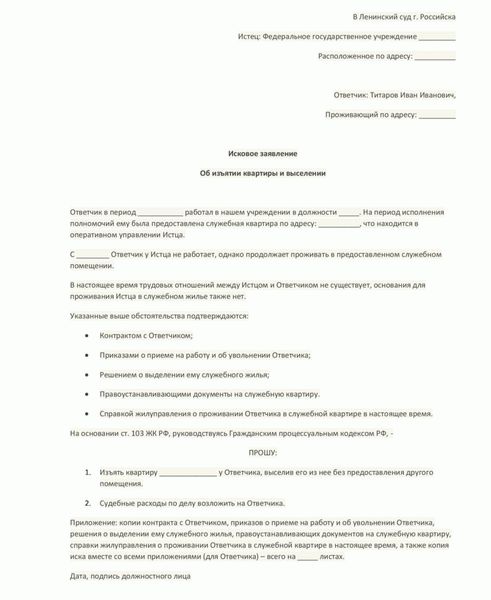Illegal residence in a residential premises in the concept of most citizens is the unauthorized, without legal grounds, occupation of such premises, which are in state or municipal ownership. In fact, illegal residence can arise in other circumstances, and in relation to a private (privatized or purchased) apartment. Getting rid of people who have moved into someone else's apartment is not easy, but it is possible. This will require a court decision on eviction, and often the assistance of bailiffs in the forcible expulsion of illegal tenants. But before you go to court, you need to correctly write an eviction application!
Illegally residing persons include citizens who do not have legal grounds (rights) to reside in a specific residential premises: property rights, social tenancy agreements, permanent or temporary registration.
There are also cases when persons who previously had the right to reside in an apartment lose it and, at the initiative of the owner, can be evicted:
- Termination of family relations with the owner (family member of the owner) of the apartment;
- Expiration of the lease agreement (lease or sublease);
- Expiration of the temporary registration period for a visiting resident.
It is important to remember that according to Art. 20 of the Civil Code of the Russian Federation, a citizen has the right to register (register) his minor child in his place of residence, even without the consent of other owners/tenants of the residential premises, and it will be very difficult to expel such a tenant.
How to prove illegal residence
Since the grounds for living in an apartment (that is, ownership and ownership) are documents of title - a warrant for occupancy or a social tenancy agreement, privatization documents, a certificate of ownership, the absence or invalidity of such documents from persons living in the apartment will indicate that that they have no right to occupy housing.
Each owner has the right to demand the recovery of his property from someone else’s illegal possession (Article 304 of the Civil Code of the Russian Federation), as well as to protect it by all legal means.
If a person illegally living in an apartment does not agree to leave it voluntarily, he will have to go to court with a claim for eviction from the apartment.
To such an application, you must attach your documents on ownership, as well as evidence confirming, in the opinion of the plaintiff, the fact of illegal residence there of specific citizens (defendants).
It must be remembered that in court, each party will have to prove the circumstances to which it refers in support of its claims or objections (Article 56 of the Code of Civil Procedure of the Russian Federation).
Thus, the defendants will have to present documents with which they justify their residence in the apartment. The court will determine what circumstances are important in a particular case, which of the parties (plaintiff or defendant) needs to prove this.
Statement of claim for eviction from official housing
In cases where a former employee, after dismissal or layoff, does not want to move out of the service apartment voluntarily, the enterprise administration has the right to file a claim for eviction from the service apartment. The basis for a claim for eviction from official housing is the expiration or early termination of an employment contract.
Eviction claim - jurisdiction
In order for an eviction claim to be accepted for consideration, it must be filed with the appropriate court. According to the Code of Civil Procedure of the Russian Federation (Articles 23-27), eviction cases are considered by district courts (that is, courts of general jurisdiction).
In addition, it is important to know to which district court the claim and the documents offered for it should be transferred. According to paragraph 1 of Art. 30 of the Code of Civil Procedure of the Russian Federation, a claim is filed in court at the location of the property, that is, residential premises (apartments, rooms, houses).
Such jurisdiction is called exclusive, that is, another court (not at the location of the property) will not consider the case).
Statement of claim for eviction from residential premises

Issues of eviction from residential premises are regulated by housing legislation. If the tenant does not want to move out of his own free will, the owner has the right to file a claim for eviction. This is the only legal way to get rid of annoying tenants who violate the rules of living in the house.
This is important to know: Minimum area and size of a land plot when dividing a land plot
How to file an eviction claim depending on your specific situation? After reading our article, you will find out where to file an eviction claim, what to include in the contents, and how much it costs? Especially for you, we have prepared current samples of eviction claims for 2020.
How to file a claim in court for eviction, grounds for eviction
An interested person (plaintiff), in order to obtain a court decision on the eviction of persons illegally residing in an apartment, must draw up a statement of claim and submit it to the court for consideration. This can be done either independently or with the involvement of a specialist (lawyer, lawyer).
Russian legislation directly provides for the following cases (grounds) for eviction of persons from housing:
- if they have lost the right to use the premises or do not comply with the right to use them (Article 35 of the Housing Code of the Russian Federation);
- at the end of the period of use of the apartment/premises (this happens, for example, at the end of the period for provision of temporary, official housing, the validity period of a court decision on the provision of premises);
- at the request of the owner who filed an application to evict illegal tenants and received a corresponding court decision.
The claim (application for eviction) substantiates the requirements, that is, the reason why citizens should be evicted from a residential premises, it must be provided for by law.
The right to housing is constitutional; no one can be deprived of housing except on legal grounds.
Statement of claim for eviction from a privatized apartment
Unlike municipal residential premises, when evicting from privatized apartments, the initiator is an individual who owns the residential premises on the basis of a purchase and sale agreement, or who received the apartment by inheritance, as a gift.
Prescribed
The owner of a residential premises may evict another registered tenant on the following grounds:
- Divorce . In the event of a divorce, a spouse who is not the owner or co-owner of the apartment ceases to be considered a member of the owner’s family and is subject to eviction.
- Debt on utility bills . Such cases are possible when tenants occupy residential premises on the basis of a commercial lease agreement, that is, the owner of the apartment allows tenants into it who are late in utility payments.
- Antisocial behavior . It is possible to evict both those living under a rental agreement (tenants) and family members of the apartment owner.
- Conscious (intentional) damage to property . There are cases when a non-owner, living and registered in a privatized apartment, carries out illegal redevelopment, or commits other actions as a result of which the residential premises become unusable. In this case, the owner has the right to demand that the tenant bring the apartment to its previous condition, and if the tenant does not comply with the demands of the apartment owner, to evict him.
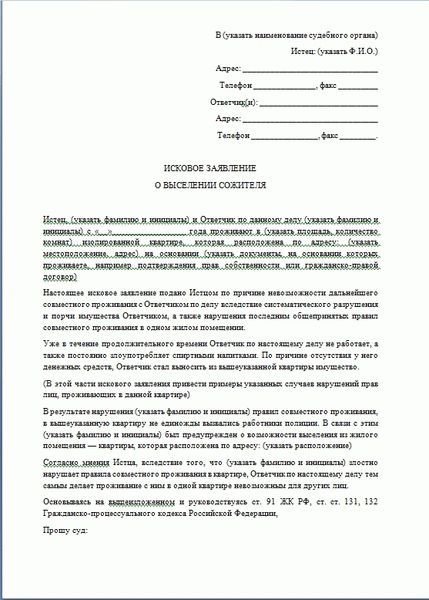
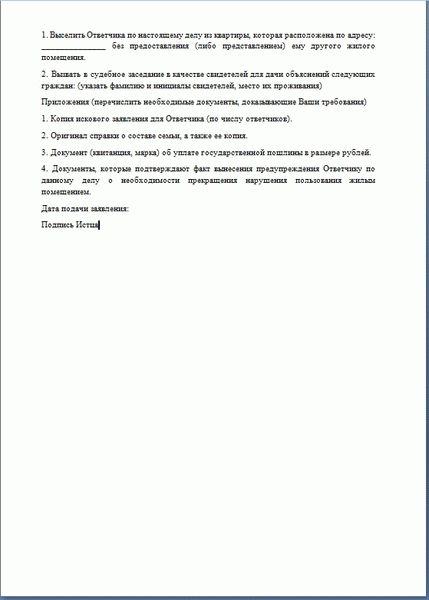
Not registered
Citizens living in a privatized apartment without registration are considered to have moved in without permission, that is, living illegally. Evicting tenants living in an apartment without registration is not particularly difficult. To do this, it will be enough to contact law enforcement agencies.
Owner
The judicial practice regarding the eviction of the owner stands apart. Such eviction is extremely difficult and impossible without very compelling reasons. The grounds for eviction of the owner may be:
- Long-term non-payment of utility bills . To initiate an eviction for non-payment of utility bills, the utility debt must be at least six months old. The eviction occurs “nowhere”, the residential premises are confiscated from the debtor, sold, the proceeds are used to pay off the debt, the money remaining after the debt is paid is transferred to the former owner.
- Inappropriate use of residential premises . Eviction is possible only if the owner poses a threat to the life and health of others. No alternative accommodation will be provided.
- Significant damage to neighbors . Based on Art. 293 of the Civil Code of the Russian Federation, if the owner of a residential premises maliciously violates the rights of neighbors or allows the destruction of an apartment, he may be deprived of the right of ownership of his housing. In this case, the apartment is also sold, and the proceeds from the sale, after deducting all legal costs, are transferred to the offender. No alternative accommodation is provided.
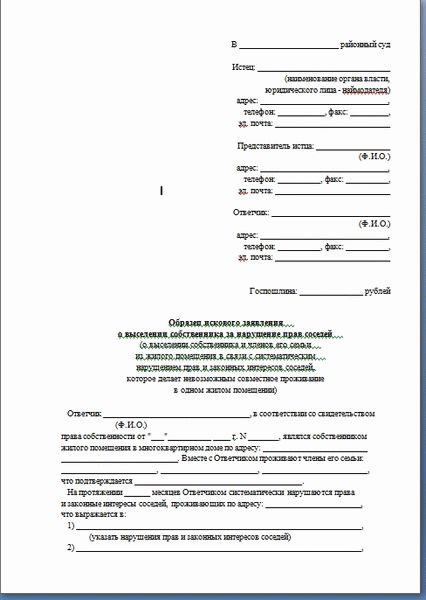
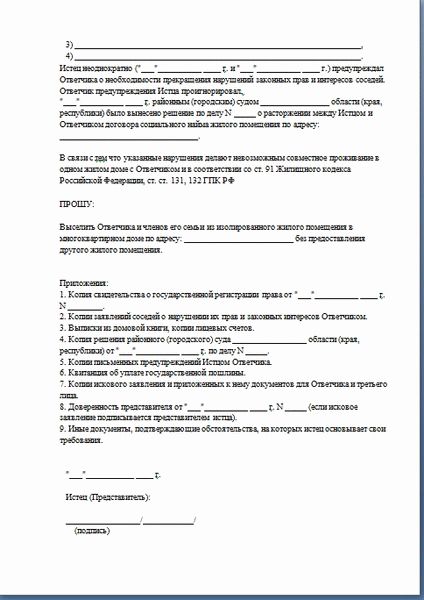
Writing rules, application requirements
An application for eviction (claim) must be drawn up in writing, according to the rules of Art. 131 Code of Civil Procedure of the Russian Federation.
This article defines the main points that must be indicated in the plaintiff's document:
- Name and address of the judicial institution;
- Information about the plaintiff (full name, address, passport details);
- Information about the defendant/defendants;
- The essence of the requirement and the basis for the requirement;
- A request to take certain actions (expel, evict, vacate the apartment from the presence of illegal residents, etc.);
- List of attached documents;
- Date and signature.
The application is accompanied by a copy of the title documents for the housing (on the right of ownership, a social tenancy agreement, if the apartment is municipal), a document on the state duty, copies of the application and documents on the number of persons involved (that is, all participants in the trial).
The court checks the completion and validity of the statement of claim. If the procedure or requirements for the claim are not followed, consideration of it may be refused.
Statement of claim for eviction from a municipal apartment
Compiled by the owner represented by the local administration. Other residents of the apartments, for example, neighbors in a municipal apartment in the building, can report violations.
Prescribed
Violation of the terms of the social tenancy agreement leads to the forced eviction of the registered person. Such persons can be considered the employer and his family members.
The administration warns residents about early termination of the contract at least three months before the specified date (Clause 2, Article 91.10 of the Housing Code). If the tenants refuse to vacate voluntarily, the owner files a claim in court.
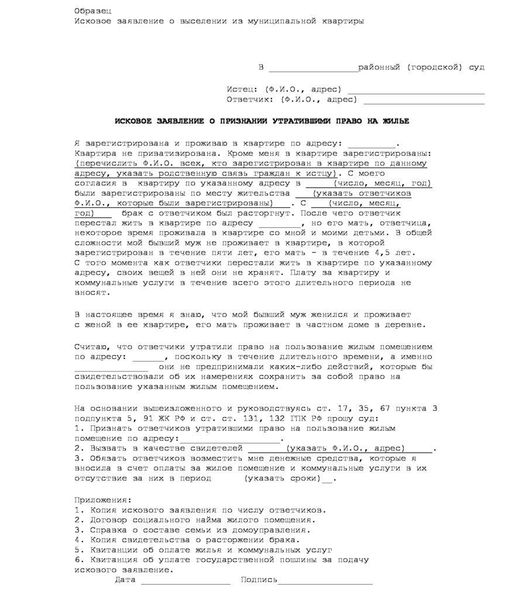
Not registered
Lack of registration makes it illegal for residents to stay in the apartment. Consequently, if people live in a municipal apartment without a social tenancy agreement, the executive committee has the right to evict them in court. No other housing is provided, since the residents were not initially included in the social tenancy agreement, and therefore were not considered a low-income category of citizens.
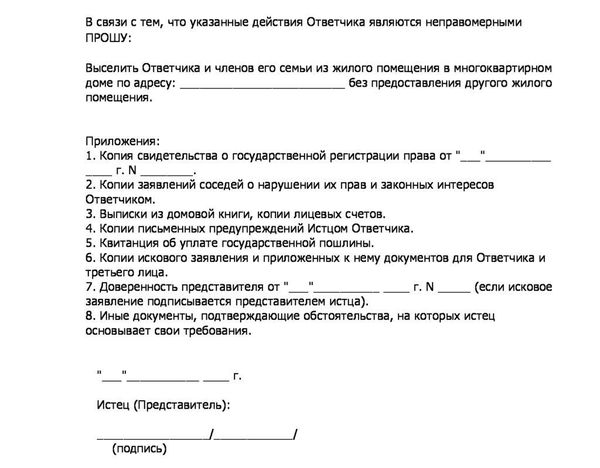
State duty
There is a state fee for considering a case in court. The requirement to evict illegally residing persons from an apartment, although it relates to property matters (the right to property), but does not have a material (monetary) value. Therefore, according to clause 3, part 1, art. 333.19 of the Tax Code of the Russian Federation, the state duty for such claims is 300 rubles.
Details of the account to which the fee is transferred can be found either directly from the district court or on its website. A receipt for payment of the fee is attached to the statement of claim.
Statement of claim for eviction from a privatized apartment
The difference from previous legal relations is in the status of the owner - he is an individual. An apartment can be owned by right of ownership under a contract of sale, inheritance, deed of gift, exchange, etc.
Let's figure out how judicial eviction occurs:
Prescribed
There are a number of grounds under which the owner can deprive residents of the right to reside in an apartment:
- divorce from spouse;
- non-payment of utilities;
- intentional damage to property;
- immoral, antisocial behavior.
Of course, if a person has a residence permit in an apartment, you can’t just evict him. Especially if a family member refused privatization in favor of the current owner of the apartment. However, for serious reasons, tenants can be evicted - without the provision of a new residential property.
Not registered
The opposite category to those registered are those who moved into an apartment without permission (illegally living in it). They do not have registration, which means they also do not have the right to live in the apartment.
If the illegal residents do not want to move out voluntarily, as the owner wants, the latter goes to court with a claim for eviction.
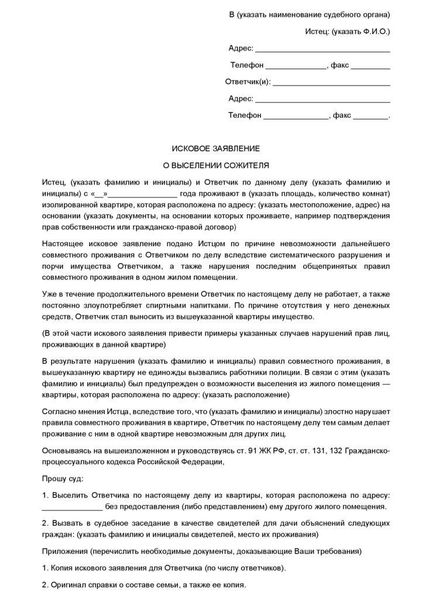
Owner
Judicial practice knows a few examples when the owners themselves were subject to eviction. In order to deprive a person of a roof over his head, compelling reasons are needed: failure to pay for housing and communal services for a period of more than six months, improper use of housing, damage to neighbors (Article 293 of the Civil Code of the Russian Federation).
Read more about when eviction is possible - and when it will be refused in the article “Forcible eviction of the owner from the apartment.”
The claim is filed on behalf of the housing authority. Neighbors can file a collective complaint with the housing department or local administration. They do not have the right to sue.
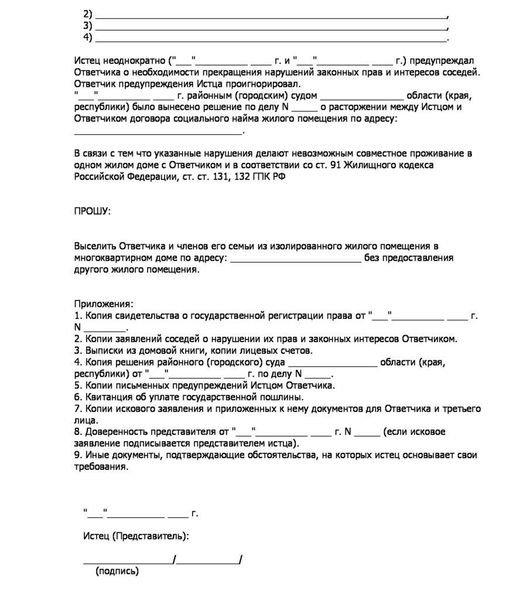
Where should the claim be registered and certified?
After drawing up a claim and collecting documents for it, you should transfer them to the office of the district court. This can be done in person, by mail (with notification, registered mail), or through a representative. If a representative acts in the interests of a person, his powers are confirmed by a power of attorney.
There is no need to register or certify the claim anywhere. After documents are transferred from the court office to a specific judge and accepted for judicial proceedings, participants will be notified of this by a court notification (in writing).
Important: resolution of the case may take about 3 months (two of them for consideration in court, a month for a possible appeal of the decision by the party who disagrees with the decision).
Statement of claim for eviction from a private home
Practically no different from a regular claim for eviction from a residential premises. Another thing is that the grounds will be somewhat different. For example, debts for utilities are not relevant here - the private sector is not serviced by the Management Company.
It is very difficult to expel the owner from a private home. Especially if the cottage is the only housing. The grounds must be substantiated with the help of documents: administrative protocols, complaints from neighbors, an inspection report of the house and surrounding area, damage assessment, etc.
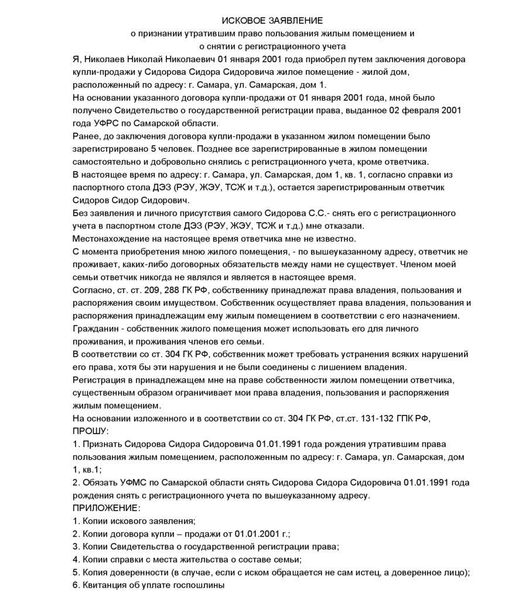
Sample statement of claim for eviction from an apartment
A statement of claim for eviction from an apartment may not be written according to the sample, since there is simply no established form. However, not all plaintiffs are ready to draw up a statement on their own.
In this case, sample statements of claim for eviction from an apartment will help, drawn up for different cases, in particular, if you need to evict:
- Former spouse. Unless otherwise established by agreement of the spouses (for example, a marriage contract), after a divorce, the right to use the apartment for the former non-owner spouse is not retained, and they can be evicted in accordance with clause 4 of Art. 31 LC RF (by court decision). The application for eviction must be supplemented with a copy of the divorce certificate and the court decision on divorce. ⇒ Sample statement of claim for eviction;
- From a municipal apartment. Such an application is submitted by the municipality, as the owner of the property. The grounds for eviction may be: failure to pay housing and communal services for more than six months, violation of the rules of residence or the rights of neighbors, misuse of the apartment. The eviction procedure can be initiated by both the tenants of the apartment, neighbors, or other persons (records of relevant inspections, certificates of debts, protocols of the district police officer, etc. are important here). ⇒ Sample statement of claim for eviction from a municipal apartment;
- Illegally residing. A statement of claim for the eviction of illegal tenants (they can be either persons who moved in without permission, or, for example, tenants who do not want to move out at the end of the contract) must be supported by protocols on an administrative offense (that is, illegal residence), drawn up by the district police officer, witness statements, documents on change of owner, etc. ⇒ Sample statement of claim for eviction of illegally residing citizens;
- Roommate . In this case, the claim is written similarly to the previous one, because if the cohabitant is not a co-owner of the apartment, its legal owner has the right to refuse him residence at any time. ⇒ Statement of claim for eviction of a cohabitant;
- The owner. The grounds for depriving the owner of a particular home must be compelling and supported. They are listed in Art. 293 of the Civil Code of the Russian Federation: improper use, violation of the rights of neighbors and others, damage to a building/dwelling, non-payment of housing and communal services. ⇒ Sample statement of claim to evict the owner for violating the rights of neighbors.
Statement of claim for eviction
In ___________ district court of Moscow (address)___________________________
plaintiff: (full name)_________________________________ (address)_________________________________________ defendant: (full name)______________________________ (address)_________________________________
third party: Department of the Federal Migration Service for Moscow 115035, Moscow st. B. Ordynka 16/4 building 4
State duty: based on clause 3, part 1, art. 333.19 of the Tax Code of the Russian Federation is ____ rubles STATEMENT OF CLAIM for eviction
I _________________ own ____ share of the apartment located at the address: ______________________________. Certificate of ownership series No.___________ dated __.__.____. The other owners of the apartment are _________________ and _____________ for __ share each. Certificate of ownership series No. ______ dated __.__.____, certificate of ownership. No_________________ dated __.__.____ I acquired the right of ownership on the basis of a purchase and sale agreement for __ share in the ownership of the apartment dated __.__.____, concluded between me – _______________________ and _________________________________. In addition to me, the following persons are registered in the indicated living space: __________________________, __.__.____. __________________________, __.__.____ __________________________, __.__.____ This circumstance is confirmed by an extract from the house register dated __.__.____. During the period up to ____ year, ________________ was in a registered marriage with the defendant - __________________. _____________, together with ______________ and minor children, lived in an apartment located at ________________________. In ____ year, namely __.__.____. The marriage between _______________ and the defendant is dissolved. Divorce certificate No.____________ dated __.__.___ Article 35 of the Constitution of the Russian Federation guarantees the right to own property, own, use and dispose of it, both individually and jointly with other persons. In accordance with Art. 209 of the Civil Code of the Russian Federation, the owner has the rights to own, use and dispose of his property. By virtue of Part 1 of Art. 30 of the Housing Code of the Russian Federation, the owner of a residential premises exercises the rights of ownership, use and disposal of the residential premises belonging to him by right of ownership in accordance with its purpose and the limits of its use, which are established by this Code. Based on Part 1 of Art. 31 of the Housing Code of the Russian Federation, members of the family of the owner of a residential premises include his spouse living together with this owner in the residential premises belonging to him, as well as the children and parents of this owner. Other relatives, disabled dependents and, in exceptional cases, other citizens may be recognized as members of the owner’s family if they are settled by the owner as members of his family. According to Art. 304 of the Civil Code of the Russian Federation, the owner may demand the elimination of any violations of his rights, even if these violations were not associated with deprivation of possession. In accordance with Art. 292 of the Civil Code of the Russian Federation, members of the owner’s family living in residential premises belonging to him have the right to use this premises under the conditions provided for by housing legislation. Members of the owner's family who are legally capable and have been limited in their legal capacity by the court and who live in the residential premises belonging to him are jointly and severally liable with the owner for the obligations arising from the use of the residential premises. Currently, there is a violation of my rights and legitimate interests on the part of the defendant – _________________. The defendant is not a member of the owner’s family, while the defendant refuses to voluntarily leave the residential premises owned by me and continues to live in the residential premises located at the address: ____________________ without legal grounds. At the same time, _____________ drinks alcohol, creates a conflict situation, as a result of which living together with him in the same living space is not possible. In addition, ______________ has a place for permanent residence in addition to the disputed apartment at the place of his permanent registration. According to Part 2 of Art. 292 of the Civil Code of the Russian Federation, the transfer of ownership of a residential building or apartment to another person is the basis for termination of the right to use residential premises by family members of the previous owner, unless otherwise provided by law. Thus, there are grounds for satisfying my claims, namely: termination of ______________________’s right to use residential premises and eviction from the residential premises located at the address: _____________________________________.
Based on the above and guided by Art. 209, 288, 292, 304 of the Civil Code of the Russian Federation, part 1 of article 30, part 1 of article 31 of the Housing Code of the Russian Federation, -
I ASK THE COURT:
Evict ____________________ from the residential premises located at: _____________________________.
Attachments: 1. Copy of the statement of claim; 2. A copy of the receipt for payment of the state duty; 3. A copy of the certificate of ownership __________________; 4. A copy of the certificate of ownership __________________; 5. A copy of the certificate of ownership __________________; 6. A copy of the purchase and sale agreement for __ share of residential premises; 7. A copy of the divorce certificate between ____________ and ________________; 8. A copy of an extract from the house register dated __.__.____; 9. A copy of the representatives' power of attorney.
(FULL NAME)____________________
" " _______________ 201_
Statute of limitations for eviction cases
Limitation period is the period during which a person whose rights have been violated has the right to submit his claims to the court.
According to the general rule established by Art. Civil Procedure Code of the Russian Federation, the limitation period is three years. After the specified time has expired, even if the claim is filed in court, the defendant, before the start of the proceedings, has the right to declare that the deadline has been missed (Article 199 of the Civil Code of the Russian Federation), and the court will refuse the plaintiff to consider the case.
As for issues of eviction from residential premises, such a three-year period is calculated from the moment when the defendant’s legal basis for residence (use) of the premises expired (for example, the relationship between former spouses ended in divorce).
If a case is being considered regarding the termination of the use of residential premises by persons occupying such premises without legal grounds, the statute of limitations does not apply.
Cases of eviction of illegally residing persons from residential premises are quite common. Since they are associated with deprivation of the right to use/occupy housing, the court comprehensively considers all the circumstances, examines evidence, family ties, grounds for the emergence and termination of the right to use, etc. Enforcement of a court decision to evict citizens from their housing is carried out on the basis of a writ of execution (writ of execution) bailiffs, in the manner prescribed by Federal Law No. 229-FZ.
Statement of claim for eviction from a private home
Grounds for eviction from a private home may include:
- Foreclosure of a property . It is possible in the case of a material lawsuit if the defendant has no other material assets to fulfill it. In this case, the house is seized, the former owner is evicted, the house is sold at auction, and the proceeds from the sale are used to pay off debts under claims. Foreclosing on a residential building is impossible if the defendant does not have alternative housing.
- Malicious violation of the rules of residence . These could be violations of sanitary and epidemiological regulations, for example, breeding a huge number of livestock in close proximity to neighbors’ plots, or violation of fire safety rules. In other words, actions that result in the creation of unbearable living conditions for others, or that directly threaten their life and safety.
This is important to know: Claim for forced eviction from an apartment: sample
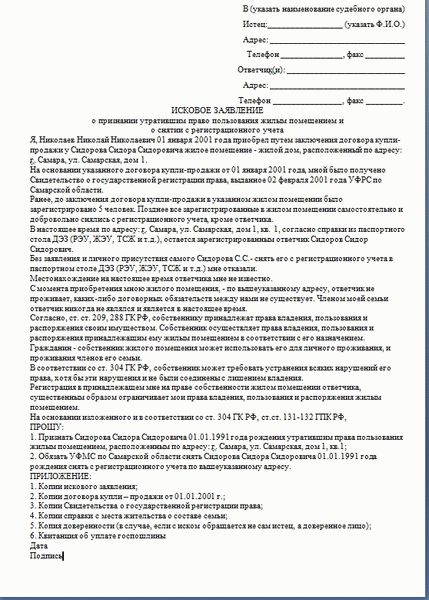
Sample statement of claim for eviction of illegal residents sample
It is necessary to know the facts of your case in order to correctly state the grounds. Here is one example of such a claim:
Kirovsky District Court of Rostov-on-Don
344002, Rostov-on-Don, lane. Gazetny, 36
Plaintiff: ____________________
Address: __________________________
Respondent: ___________________________
Address: _____________________________
Third party: Department of the Federal Migration Service of Russia for the Rostov region in the Kirovsky district of Rostov-on-Don
Address: ___________________
State duty: 400 rubles
STATEMENT OF CLAIM
ABOUT EVICTION AND DE-REGISTRATION
Based on the certificate of state registration of rights issued by the Office of the Federal Service for State Registration, Cadastre and Cartography for the Rostov Region, on June 25, 2012, the Plaintiff acquired ownership of apartment No. 1 in building _______ on ________ street in the city of Rostov-on-Don.
Until now, the Plaintiff has not been able to exercise her right of ownership, use and disposal (the rights of the owner) of the residential premises that belong to her in connection with living in the defendant’s apartment. The defendant lived in this apartment with the plaintiff's mother. After her death, the defendant continues to live in the apartment and creates obstacles for the plaintiff to use the apartment.
In accordance with Art. Art. 209, 288 of the Civil Code of the Russian Federation, the owner of a residential premises has the rights to own, use and dispose of his property. The owner exercises the rights of ownership, use and disposal of residential premises belonging to him in accordance with its purpose.
In accordance with Art. 304 of the Civil Code of the Russian Federation, the owner may demand the elimination of any violations of his rights, even if these violations were not associated with deprivation of possession.
By virtue of paragraph 1 of Article 35 of the Housing Code of the Russian Federation, in the event of termination of a citizen’s right to use residential premises on the grounds provided for by this Code, other federal laws, an agreement, or on the basis of a court decision, this citizen is obliged to vacate the corresponding residential premises (stop using it). If this citizen does not vacate the said residential premises within the time period established by the owner of the relevant residential premises, he is subject to eviction at the request of the owner based on a court decision.
On May 11, 2012, the defendant was sent a letter (with notification) by the plaintiff demanding that he vacate the apartment within three calendar days. The defendant refuses to voluntarily leave the premises.
According to clause 31 of the rules for registration and deregistration of citizens at the place of stay and place of residence within the Russian Federation and the list of officials responsible for registration, deregistration of a citizen at the place of residence is carried out by the registration authorities in the event of eviction from an occupied residential premises or recognition who have lost the right to use residential premises - on the basis of a court decision that has entered into legal force.
Based on the above and guided by clause 31 of the rules for registration and deregistration of citizens at the place of stay and place of residence within the Russian Federation and the list of officials responsible for registration, Art. 209.288, 292 Civil Code of the Russian Federation, art. 35 LC RF, art. 131-132 Code of Civil Procedure of the Russian Federation I ASK:
1. Recognize ______________ as having lost the right to use residential premises and evict him from the occupied apartment located at the address: ____________
2. Oblige _____________ to vacate the residential premises and hand over to _________________ (full name of the plaintiff) the keys to the residential premises located at ________________
Application:
1. Copies of statements of claim – 3 copies;
2. Receipt for payment of state duty;
3. Copies of the certificate of state registration of rights;
How to properly file a claim for eviction
The statement of claim for eviction is drawn up according to certain rules, must be written in legally and grammatically correct language, and must not contain offensive definitions or vague descriptions. The document must contain the following points:
- The so-called “hat”. Located in the upper right corner. Indicate: the name and address of the court to which the claim is filed and personal information about all participants in the process. Below in the center is the name of the document: “Statement of Claim for Eviction...”.
- Descriptive (motivational) part . In this part, the plaintiff describes the preamble of the claim, describes the facts and circumstances of the case that serve as the basis for the plaintiff’s position: information about the disputed residential premises;
- who is the owner of the apartment and on what basis;
- information about all residents;
- whose and what rights the defendant violated;
- what is the violation?
- grounds (1) for eviction;
- information about attempts at pre-trial (2) settlement of the dispute.
The document must be printed in several copies (according to the number of participants in the process). If the plaintiff files one copy of the claim, registration of the application will be refused.
- When describing the grounds for eviction, the plaintiff must confirm that the residential premises are in his ownership, and on what grounds, and also list everyone living in this apartment, including himself. Next, he indicates the person he is asking to evict and the grounds (with references to points of legislation) on which he makes the demand.
- A necessary item in the statement of claim. If the plaintiff did not try to implement the pre-trial procedure for resolving the dispute, then the court may refuse to consider the claim. To confirm the pre-trial procedure for resolving the situation, the plaintiff may refer to a written demand/notification/warning to the violator on the part of the plaintiff, as well as testimony of witnesses.
- In this paragraph, the plaintiff must indicate the address of the residential premises from which he wants to evict the defendant and a petition to forcibly evict the violator. In the same paragraph, the plaintiff can petition to summon witnesses in the case, as well as request any document or certificate (in the event that he himself cannot obtain them, for example, the bank will give an extract from the defendant’s bank account only at the request of the court) .
Let's summarize. A statement of claim to the court is an official application by an individual or legal entity with a petition to resolve a housing dispute within the framework of Russian legislation. In any case, only the owner of the residential premises (an individual or organization) can act as a plaintiff, except for claims against the owners of residential premises. In this case, the plaintiff may be the municipality on whose territory the disputed apartment is located.
How to compose it correctly?
The inability to resolve the issue amicably leads the owner to court. The question arises: how to fill out a claim correctly so that the court does not have any questions?
Contents of a claim for eviction from a residential premises in 2020:
- Upper right corner (“header”) – indicate the name of the court, full name, contacts and telephone numbers of the parties;
- Below in the center is the name of the claim document;
- Descriptive part – information about the apartment, room; ownership; information about residents;
- Reasons for eviction - what rights were violated; were there any attempts to resolve the dispute at the pre-trial stage; what articles the plaintiff refers to;
- Petition to summon witnesses to court (if necessary);
- List of attachments - documents that the plaintiff attaches to the claim;
- The lower section is the date the claim was filed; plaintiff's signature with transcript.
A common mistake is filing a claim in a single copy on behalf of the applicant. In fact, the plaintiff will be required to submit at least three copies of the application , depending on the number of participants in the court hearings (Article 132 of the Code of Civil Procedure of the Russian Federation). Failure to comply with this requirement results in refusal of registration.
This is important to know: Where to submit 6 personal income taxes for a closed separate division
Found documents on the topic “statement of claim for eviction from an apartment sample”
- Statement of claim for eviction from an apartment Statements of claim, complaints, petitions, claims → Statement of claim for eviction from an apartment
to the district court plaintiff: , place of residence: , defendant: , place of residence: . statement of claim for eviction on the basis of the purchase and sale agreement n dated "" (copy attached) I, , purchased ... - Sample dated December 13, 1995 Claim statement O eviction subtenants and temporary residents
Statements of claim, complaints, petitions, claims → Sample dated December 13, 1995 Statement of claim for the eviction of subtenants and temporary residents... ask: to evict from the living quarters. (full name of subtenants (temporary residents)) attachments: 1. copies of statements of claim according to the number of defendants. 2. documents confirming the plaintiff’s right to the disputed area (copy of financial and personal account...
- Sample dated December 13, 1995 Claim statement O eviction subtenants from the reserved residential premises
Statements of claim, complaints, petitions, claims → Sample dated December 13, 1995 Statement of claim for the eviction of subtenants from a reserved residential premises...from Art. 65 ZhK RSFSR, please: evict from living quarters. (full name of the subtenant) attachments: 1. copies of statements of claim according to the number of defendants. 2. documents confirming the plaintiff’s right to the disputed living space (warrant, housing agreement...
- Sample. Claim statement on recognition of ownership rights to apartment
Statements of claim, complaints, petitions, claims → Sample. Statement of claim for recognition of ownership of an apartmentto the intermunicipal district (people's) court of the city, the plaintiff: (last name, first name, patronymic) (address) a statement of claim for recognition of ownership of the apartment in the interests of a minor...
- Sample dated June 15, 1995 Claim statement on compensation for damage caused by the gulf apartments
Statements of claim, complaints, petitions, claims → Sample dated June 15, 1995 Statement of claim for compensation for damage caused by flooding of an apartment... to establish the cost of things that have fallen into disrepair and restoration of the apartment . attachments: 1. copies of statements of claim according to the number of defendants. 2. extract from the house register and copies of financial and personal accounts. 3. living space plan. ...
- Claim statement O eviction former family member of the owner from the residential premises
Statements of claim, complaints, petitions, claims → Statement of claim for the eviction of a former family member of the owner from a residential premises... to the district court plaintiff: address: telephone: defendant: address: telephone: statement of claim for the eviction of a former family member of the owner from a residential premises I am the owner of a residential premises...
- Claim statement O eviction former family member of the owner of the premises
Statements of claim, complaints, petitions, claims → Statement of claim for eviction of a former family member of the owner of a residential premises... court) plaintiff: (full name, address) defendant: (full name, address) third party: (full name, address) statement of claim for the eviction of a former family member of the owner of the residential premises I am the owner of the residential premises located...
- Statement of to recognize a former family member as having lost the right to use residential premises and eviction
Statements of claim, complaints, petitions, claims → Statement of claim to recognize a former family member as having lost the right to use residential premises and eviction - Claim statement on compensation for damage caused by the gulf apartmentsprovided under a social tenancy agreement
Statements of claim, complaints, petitions, claims → Statement of claim for compensation for damage caused by flooding of an apartment provided under a social tenancy agreement...res: , , city, st. d. sq. . passport, issued ..20, claim price: () rubles. State duty: () ruble. statement of claim for compensation for damage caused by the flooding of an apartment provided under a social tenancy agreement, according to...
- Sample. Statement on consent to privatization apartments
Protection of property rights → Sample. Application for consent to privatize an apartmentapplication for consent to the privatization of an apartment in the city from gr. (full name) address: application (place and date by…
- Claim statement on the obligation to transfer into ownership (by way of privatization) departmental apartment
Statements of claim, complaints, petitions, claims → Statement of claim for the obligation to transfer ownership (by privatization) of a departmental apartmentto the district court plaintiff: place of residence: defendant: location of statement of claim for the obligation to transfer into ownership (by way of privatization) a departmental apartment I, , live at the address...
- Sample. Statement to rename a phone in connection with an exchange (purchase, receipt) apartments
Statements from citizens → Sample. Application for renaming a phone number in connection with the exchange (purchase, receipt) of an apartmentask the head of the Soviet telephone center to rename phone no. , established at the address in my name, in connection with (exchange, improvement of living conditions...
- Sample. Claim statement on liquidation of the enterprise
Statements of claim, complaints, petitions, claims → Sample. Statement of claim for liquidation of an enterprise... plaintiff: state tax inspectorate for the city (district) defendant: (name of the enterprise, address) the statement of claim for the liquidation of the enterprise was formed "" 20 (name of the enterprise) its charter is registered in ...
- Sample. Claim statement on the collection of child support
Statements of claim, complaints, petitions, claims → Sample. Statement of claim for collection of child supportstatement of claim for the recovery of child support. to the district (city) court of the region (territory) plaintiff: (full name, address) from...
- Sample application from parents to obtain permission from the guardianship and trusteeship authorities for a transaction for the sale and purchase of an apartment
Real estate purchase and sale agreement → Sample application from parents to obtain permission from the guardianship and trusteeship authorities for a transaction about the sale and purchase of an apartment
Statement of claim for eviction from a mortgaged apartment
The mortgaged housing is pledged to a credit institution. Mortgage debt leads to the fact that the borrower may lose his apartment. The interests of the bank are defended by its representative - a person from the legal department of the organization.
Judicial practice knows many examples when banks seized apartments from debtors for non-payment. Hence the high percentage of winning cases in such cases.
You can learn more about the nuances, documents and legal loopholes in our article “Eviction from a mortgaged apartment“.
Statement of claim for eviction from official housing
Separate housing from a specialized fund is provided to citizens in connection with their work activities. The validity period of the employment contract is determined by the period of the employment relationship. Immediately after dismissal or layoff, the employee is obliged to vacate government-owned living space and transfer it back to the organization.
You will find separate instructions on this issue in the article “Eviction from official residential premises.”
Agencies may file a claim against:
- business travelers and their family members;
- contract military personnel;
- employees of law enforcement agencies, the Ministry of Internal Affairs, and the prosecutor's office.
The reason is the expiration of the employment contract, as well as the reluctance to vacate the living space at the request of the owner.
